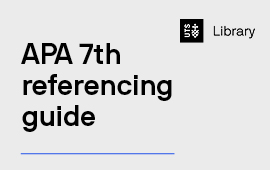The Library has been keeping a close eye on the advances in generative AI (GenAI) tools that publishers and vendors who provide access to trusted, high-quality scholarly content for learning and research have recently been developing.
We’ve pulled together a list of emerging GenAI tools that publishers have recently launched or are currently testing, so you can stay up-to-date with what’s happening in the GenAI space, find out which publisher products are available to you as a UTS academic and understand how they can benefit your teaching.
Emerging AI publisher tools
Supplier | How the AI tool works | Availability | Relevant disciplines |
Factiva | Factiva Sentiment Signals monitors Factiva news and market trends to predict emerging corporate credit risks to company and industry. | Launched by Factiva. Unavailable via UTS Library. | Business TD School |
Elsevier | ScopusAI uses sources from the Scopus database to provide high-level and expanded text summaries, concept maps and foundational papers, as well as identify potential academic collaborators. Watch a demo of Scopus AI in use. | Launched by Elsevier. Unavailable via UTS Library. | Health FEIT Science DAB TD School FASS |
Clarivate | Web of Science Research Assistant helps users grasp core concepts faster by providing concise overviews and commentaries on research queries, supported by dynamic visualisations, trend graphs, topic maps and co-citation networks. It can also help navigate complex research tasks with guided walkthroughs for conducting literature reviews and finding journals to publish in. | Launched by Clarivate. Unavailable via UTS Library. | FEIT Science |
Digital Science | Dimensions Research GPT uses a conversational interface to provide answers and summaries from Dimensions’ extensive Open Access publication records with accessible, click-through references. | Available now via ChatGPT and UTS Library catalogue.
| Health FEIT Science |
Clarivate | Proquest Research Assistant is a "research companion” for students and researchers which supports the initial scoping phase of research and generates summarised responses from relevant literature. Watch a demo of Proquest Research Assistant. | In beta testing by Clarivate. Unavailable via UTS Library.
| FASS DAB TD School |
EBSCO | EBSCOHost users can use natural language to query the database and receive quick answers to questions, summaries of papers and search for papers/materials. | In beta testing by EBSCO due to commence in 2025.
| Health FEIT Science DAB TD School FASS |
JSTOR | The JSTOR AI Research Tool will appear on the content page for journal articles, book chapters, and research reports while you search and highlight key points and arguments as well as link to related articles and topics to deepen your research. Watch a demo of JSTOR AI Research Tool. | In beta testing by JSTOR.
| FASS DAB TD School |
Lexis Nexis | Lexis+AI will use sources from the Lexis database to search and summarise case law and analyse legal questions. Users can also use this tool to draft legal memos and arguments. Watch a demo of Lexis+AI. | Launched by Lexis Nexis. Unavailable via UTS Library. | Law DAB (Built Environment) |
Thomson Reuters | Westlaw Precision is an upgraded version of the Westlaw platform, with the same enhanced features available on Westlaw Precision Australia. Both platforms offer tools such as case summarisation and cross-referencing, along with integrated GenAI functionality for natural language search and answer. CoCounsel is an optional inclusion. | Launched by Thomson Reuter. Unavailable via UTS Library. | Law |
Thomson Reuters | CoCounsel is an advanced legal research tool designed for law firms, capable of analyzing large volumes of legal documents such as contracts, and extracting relevant information. It provides insights, case law precedents, and legal analytics to support legal professionals in their decision-making processes. Watch some short CoCounsel use cases or take a more in-depth walkthrough. | Launched by Thomson Reuter. Unavailable via UTS Library. | Law |
Clarivate | Primo Research Assistant provides summaries to search queries using trusted sources from your library’s catalogue. It can help refine or expand initial search queries and provides references to full-text resources in the catalogue to deepen your search. Watch a demo of Primo Research Assistant. | In beta testing by Clarivate, expected release late 2024. | Health FEIT Science DAB TD School FASS |
Elsevier Health | ClinicalKey AI provides quick access to trusted clinical knowledge from Elsevier’s peer-reviewed library and other validated sources. It responds to natural language queries and provides users with summarised and referenced responses, which are tailored to the clinician's unique profile. It also has follow-up query capabilities and can refine outputs based on various patient complexities, such as co-morbidities and medication history. Watch a demo of ClincalKeyAI. | Launched by Elsevier Health. UTS Library does not subscribe to ClinicalKey.
| Health |
EBSCO | Dyna AI sources information from DynaMedex and Dynamic Health databases, to deliver answers to clinicians' natural language queries and support informed decisions at the point of care. Watch a demo of Dyna AI. | Launched by EBSCO. UTS Library does not subscribe to DynaMedex or Dynamic Health.
| Health |
Elsevier | Reaxys Predictive Retrosynthesis draws from high-quality chemistry data and synthetic planning AI technologies to define and test chemical reaction routes and accelerate your chemistry research. | Launched by Elsevier. UTS Library does not subscribe to Reaxys.
| Science |
Statista | Research AI assistant allows users to make natural language (including non-English) searches to obtain complex analyses and forecasts, without the need for extensive database knowledge. Watch a demo of Research AI. | Launched by Statista. Unavailable via UTS Library.
| Business Science |
Get help
- Check back here regularly for updates to new tools appearing in each discipline and how they will be available for use.
- Contact the Library to discuss GenAI publisher tools that might be essential for your teaching, so that they may be considered in the university's approach for assessing, prioritising and funding new GenAI products.
- Assist your students in understanding the ethical use, referencing and acknowledgement of GenAI in their assignments by embedding the Library’s GenAI study guide direct to your Canvas site.
- Browse a comprehensive list of non-publisher GenAI tools emerging to assist with teaching, learning, and research activities.








